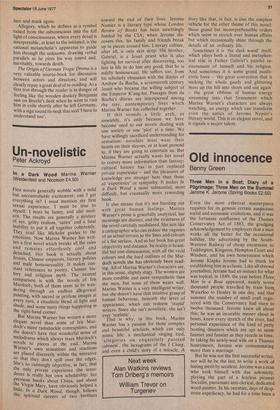Un-novelistic
Peter Ackroyd
in a Dark Wood Marina Warner (Weidenfeld and Nicolsoli £4.50)
First novels generally wobble with a mild but uncontrollable excitement: can I get everything in? I must mention my first sexual experience. I must be true to myself. I must be funny, and also modern. The results are generally a mixture of sex, gritty realism, 'satire'. and a fatal inability to put it all together coherently. They read like Michelin guides to the emotions. Now Marina Warner has written a first novel which breaks all the rules and remains effortlessly cool and detached. Her book is actually about Jesuits, Chinese emperors, literary politics and male homosexuality. It makes constant references to poetry, Chinese history . and religious myth. The nearest Comparison is with the novels of Iris Murdoch; both of them seem to be wandering through an endless allegorical Painting, with sacred or profane images at every turn, a ritualistic blend of light and shade, and some nasty things happening in the right-hand corner.
But Marina Warner has written a more elegant novel than some of Iris Murdoch's more ramshackle contraptions, and she doesn't have that wonderful sense of melodrama which always tears Murdoch's novels to pieces at the end. Marina Warner's own sensations and reactions are placed discreetly within the narrative so that they don't spill over the edges. She's so cunningly objective, in fact, that the only private experience she introduces is really her own scholarship: her Previous books about China, and about the Virgin Mary, have obviously helped a little. In a Dark Wood, though, follows the spiritual careers of two brothers toward the end of their lives. Jerome Namier is a literary type whose London Review of Books has been unwittingly funded by the CIA; when Jerome discovers this, his family and friends break up in pieces around him. Literary culture, after all, is only skin deep. His brother, Gabriel, is a Jesuit priest who is also fighting for survival after discovering, too late in life to do him any good, that he is mildly homosexual. He suffers too, from his scholarly obsession with the diaries of Andrew da Rocha, a seventeenth century Jesuit who became the willing subject of the Emperor K'ang-hsi. Passages from da Rocha's diaries are interspersed among the tiny, contemporary lives which Marina Warner has collected together.
If this sounds a little arch, or unwieldy, it's only because we have become used to our novels dealing with one society or one 'plot' at a time. We have willingly sacrificed understanding for sensation: , novelists must wear their hearts on their sleeves, or at least pretend to, if they are going to entertain us. But Marina Warner actually wants her novel to convey more information than fantasy; cultural history has in part replaced private experience — and the pleasures of knowledge are stronger here than those of 'experience' or sympathy. It makes In a Dark Wood a more substantial, more difficult, but eventually more rewarding book.
It also means that it's not bursting out with great human feelings. Marina Warner's prose is gracefully analytical, her meanings are distinct, and the strUctures of the novel carefully modulated. She acts like a cartographer who can reduce the vagaries of an actual terrain to the lines and colour's of a flat surface. And so her book has great objectivity and distance. Its reality is beautiful but one-dimensional, with all the vivid colours and the hard outlines of the Murdoch novels she has obviously been reading. All of Marina Warner's characters are, in this sense, slightly stagy. The women are more credible and more sympathetic than the men, but none of them wears well. Marina Warner is a very intelligent writer, but she doesn't have that intuitive grasp of human behaviour, beneath the level of appearance, which can redeem 'stupid' writers. Since she isn't novelistic, she isn't ever 'realistic'.
That is why, in this book, Marina Warner has a passion for those complex and beautiful artefacts which can only mimic life: a mechanical singing bird, 'allegories on exquisitely painted cabinets', the hexagrams of the I Ching, and even a child's story of a miracle. A
story like that, in fact, is also the simplest vehicle for the other theme of this novel: those grand but incomprehensible orders which seem to stretch over human affairs but which occasionally shine through the details of an ordinary life.
Sometimes it is 'the dark wood' itself, which plays both a literal and metaphorical role in Father Gabriel's painful reassessment of himself and his religion. And sometimes it is some grand pantheistic force — 'the great convection that is sucking the whole gaudy and glittering mass up the hill into shops and out again' — the great ribbons of human energy streaming into that firmament which Marina Warner's characters are always watching, an energy which can transform even the antics of Jerome Napier's literary world. This is an elegant novel, and it signals a major talent.


































 Previous page
Previous page